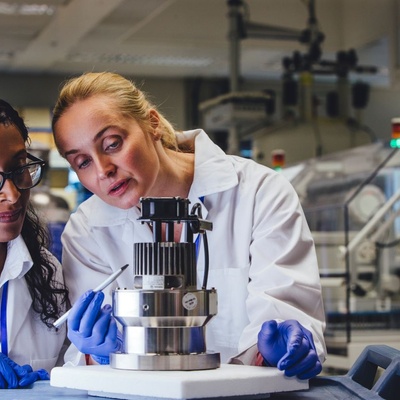As these industries continue to grow, they provide numerous career opportunities and avenues for those who aspire to make a difference. Furthermore, these advancements offer promising prospects for investors, entrepreneurs, and professionals seeking to contribute meaningfully. To highlight these possibilities, here are the top 10 emerging sectors in the scientific and technical industries:
1. Artificial Intelligence (AI) and Machine Learning
As we’ve started to see, AI is changing industries worldwide, from healthcare to finance. The advancements in deep learning, neural networks, and natural language processing have enabled powerful capabilities in image recognition, personalised recommendations, and predictive analytics. Organisations are starting to use advanced algorithms for everything from AI-driven drug discovery to process automation. In healthcare especially, AI is making strides – analysing complex data from electronic medical records, wearable devices, imaging, and genomics to provide groundbreaking insights, from identifying disease-causing genes to automating medical screening processes.
AI adoption is forecast to add trillions of dollars to the global economy. In Australia, we’re seeing impressive adoption rates of 40% compared to 41% worldwide, with projections suggesting the creation of up to 200,000 jobs by 2030. In Queensland alone, the number of AI-enabled healthcare businesses is expected to grow from 247 in 2019 to 577 by 2030, potentially generating 2,740 direct and 8,575 indirect full-time jobs (CSIRO).
AI applications are vast and varied:
- Healthcare: AI-driven diagnostics and personalised treatment plans
- Finance: Algorithmic trading and fraud detection
- Manufacturing: Predictive maintenance and quality control
- Customer Service: Chatbots and virtual assistants
2. Quantum Computing
Imagine solving problems that would take today’s fastest computers millions of years to solve - in seconds. That’s the promise of quantum computing. Quantum computers have the potential to solve complex problems far beyond the capabilities of traditional computers, with applications in:
- Cryptography: Creating virtually unhackable systems
- Drug Discovery: Simulating molecular interactions at high speeds
- Optimising Logistics: Improving efficiency in supply chain management
We’re seeing quantum computing applications across industries, particularly in medicine, where these systems will transform the discovery of highly complex treatments for rare diseases. The potential also extends beyond healthcare—from sophisticated financial modelling to materials science and solving intricate optimisation challenges that were previously impossible.
While still in the early stages, companies like Google, IBM, and several startups are investing heavily in quantum research, anticipating breakthroughs that could change industries globally. Australia, too, is positioning itself as a global leader. According to recent research, the emerging quantum industry in Australia is projected to create up to 8,700 jobs and generate $2.2 billion by 2030, potentially growing to $6 billion and 19,400 jobs by 2045.
3. Biotechnology and Genomics
Advancements in biotechnology and genomics are transforming medicine, agriculture, and sustainability. The rise of CRISPR gene-editing technology, coupled with developments in synthetic biology and genomic sequencing, has ushered in a new era of personalised medicine, where treatments can target an individual’s unique genetic profile. CRISPR technology has already shown promising results in clinical trials for sickle cell disease and beta-thalassemia. Moreover, we’re seeing increasingly sophisticated RNA technologies being used to develop treatments for challenging diseases such as HIV and various cancers.
Genetic engineering and synthetic biology also address the challenges of agriculture, biofuels, and environmental sustainability. The advent of CRISPR technology has notably impacted agricultural practices, enhancing crop resilience and effectively addressing food security challenges. The potential for cross-industry collaborations is evident as these technologies evolve, offering solutions to global health concerns and environmental challenges.
4. Renewable Energy and Clean Technology
As the world transitions to green energy, advancements in solar, wind, hydrogen, and battery storage are revolutionising the energy sector. In Australia, renewable energy already constitutes one-third of electricity production, a feat made possible by the nation’s vast solar and wind resources. With 4 million square kilometres of quality onshore wind and solar potential – second only to North Africa – Australia enjoys a unique advantage in renewable energy generation (CSIRO). This positions Australia as a leader in clean-energy-powered industries, offering more affordable energy and opportunities to decarbonise processes. Projections highlight rapid growth in renewable energy capacity and significant job creation in related fields.
Key areas of focus include:
- Solar and wind power technologies
- Energy storage solutions
- Green hydrogen production
- Carbon capture and storage (CCS)
- Small modular reactors (SMRs)
5. Nanotechnology and Advanced Materials
Nanotechnology facilitates manipulation at the atomic scale, opening up exceptional opportunities in medicine, electronics, and materials science. Researchers in Australia are making substantial contributions to this domain by developing advanced materials that exhibit novel properties, particularly in water purification and medical devices.
This field drives transformative advances across multiple sectors, reshaping how we approach technological challenges. Advanced materials, including graphene, carbon nanotubes, and smart materials, are improving everything from electronics to water purification systems and enabling precise drug delivery mechanisms in medicine.
Applications of nanotechnology include:
- Graphene: a super-strong, conductive material revolutionising electronics
- Nanomedicine: drug delivery systems that target specific cells, reducing side effects
- Ultra-efficient solar cells
- Self-cleaning surfaces
- Stronger and lighter materials for aerospace and automotive industries
6. Augmented Reality (AR) and Virtual Reality (VR)
AR and VR technologies aren’t just for entertainment anymore; they have applications in education, healthcare, and industrial training. Australia's AR/VR market is increasing, with local companies developing innovative solutions for various sectors.
Potential applications include:
- Immersive educational experiences
- Surgical training and remote medical assistance
- Virtual property tours in real estate
- Improved product visualisation in retail
A recent study by Frontiers in Digital Health highlights the potential of these immersive technologies in medical education and training to understand complex concepts such as anatomy. Studies show that VR significantly improves knowledge retention and engagement compared to traditional teaching methods. The benefits extend to enhanced skill transfer, collaborative learning opportunities, safe practice environments, and reduced error rates, indicating substantial growth potential in this sector.
7. Personalised Medicine and Immunotherapies
One sector emerging in pharmaceuticals worldwide is personalised medicine, which tailors treatments to an individual's genetic makeup, minimising side effects and increasing efficacy. These approaches offer more effective and less invasive options for diseases like cancer and autoimmune disorders. Unlike traditional treatments such as chemotherapy, which affect both healthy and diseased cells, these innovative therapeutics target specific cells and immune pathways responsible for diseases, preserving healthy tissue. Immunotherapy treatments, including CAR-T cell therapy, are particularly promising, effectively harnessing patients' immune systems to combat cancer-related conditions.
8. Chemical Recycling of Plastics
Chemical recycling represents a progressive approach to managing waste, particularly plastics, by converting them into reusable materials. This method plays a significant role in addressing the growing global plastic crisis, providing an effective solution for the challenges associated with mixed plastics. Unlike traditional recycling processes, which often necessitate sorting and cleaning, chemical recycling can break down complex plastic waste into its essential components. The outcome is the production of high-quality raw materials that can be utilised in manufacturing new products.
In Australia, the National Plastics Plan 2021 outlines a comprehensive strategy to phase out problematic plastics by 2030. This plan aims to mitigate environmental harm and boost the demand for innovative recycling solutions to manage plastic waste more effectively. By fostering advancements in recycling technology, Australia hopes to create a more sustainable future while encouraging responsible consumption and waste management practices.
9. Medical Research
Australia is recognised for its dynamic biotechnology and medical research sector, committed to addressing critical health challenges. This industry focuses on the development of innovative solutions for rare diseases, the creation of effective vaccines, and the advancement of diagnostic technologies.
Australia consistently ranks among the top 10 countries globally regarding research output in life sciences, as reported by the Nature Index. The nation benefits from a solid commitment to R&D, with increasing investments to drive advancements in healthcare. These investments enhance Australia's reputation as a medical research leader and contribute to global health improvements.
10. Food Technology
Finally, developments in food technology are significantly transforming how we produce and consume food, offering sustainable solutions to meet the challenges of modern diets.
Here are some of the key advancements:
- Lab-grown meat: reducing reliance on traditional farming
- 3D food printing: customising nutrition for specific dietary needs
- Plant-based alternatives: meeting the demand for sustainable diets
- Advanced food preservation methods
Australia is experiencing a significant rise in interest regarding alternative proteins, which aligns with global efforts to improve food security and address the need to reduce environmental impacts. By embracing these developments, Australia is making a valuable contribution to creating a sustainable food ecosystem that benefits its people and the environment.
Connect with Evolve!
The scientific and technical industry is entering an era of unprecedented innovation, with these emerging sectors driving global change. Staying ahead of these industries offers opportunities to make meaningful contributions towards a sustainable, technologically advanced future.
At Evolve, we connect talented professionals with exciting opportunities in these growing sectors. Explore our roles or contact us today to discover how you can be part of the industries shaping tomorrow.





